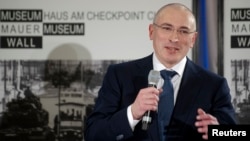Mikhail Khodorkovsky has been many things: a Communist Party youth group leader who became one of post-Soviet Russia's first billionaires, thanks to a controversial, corruption-riddled privatization process; a philanthropist who, in 2001, established Open Russia, a foundation dedicated to building and strengthening civil society in Russia.
He also has been a prisoner, having spent 10 years behind bars on charges of tax evasion, embezzlement and money laundering before being pardoned last December by the man widely believed responsible for putting him there -- President Vladimir Putin.
The former oil tycoon, who now lives in exile in Switzerland, announced last month that he was reviving Open Russia, which closed down in 2006 after Russian authorities froze its bank accounts.
'Communication platform'
The relaunched foundation says it will serve as a "communication platform" for those "to whom the rule of law and fair elections are not empty phrases," focusing on independent media, political education and support for political prisoners.
Khodorkovsky visited the United States this week. In a speech in Washington to the annual awards dinner of the human rights group Freedom House, he said that when he left prison he found that during his decade inside, Russia under Putin had "been flung back far into the distant past."
"Concealed behind a façade of outward prosperity is the fact that the country has stopped its development," he said. "The profusion of goods in the stores and the abundance of money in people’s pockets should not fool anybody. The regime cannot take credit for this; it is a function of the oil market."
Referring to Russia's actions in Ukraine, Khodorkovsky said Putin's government "is trying to throw the whole world back into the era of the Cold War [if not a hot one], when disputes are resolved at the point of a gun, while one’s superiority is proven not by rates of economic growth, but by military aggression."
While in Washington, Khodorkovsky spoke with VOA's Russian service. He said the goal of what he called Open Russia's "new project" is to help "the European-oriented parts" of Russian society “find each other” and “learn to act together for their common interests -- that is, to become an influential political force in Russia."
Eye on parliamentary elections
He said an important step in this direction will be Russia's next parliamentary elections, set for March 2018, during which "this part of society must make itself known more loudly than it has before." He conceded, however, that such efforts will probably not affect the outcome of the vote, given that in today's Russia, "it’s not important how you vote, but how the votes are counted.”
Last month, Khodorkovsky hinted he could seek Russia's presidency. He told France's Le Monde newspaper that while he would not be interested in a presidential bid if the country was "developing normally,” he would "be ready to take on this part of the task" in order to "carry out constitutional reform" aimed at redistributing presidential powers "in favor of the judiciary, parliament and civil society."
He told VOA he has no interest in “getting power over the bureaucracy,” but added that “in the current Russian realities, it is necessary to influence, and to influence using serious political methods.”
Surveys conducted by the Levada Center, an independent Russian polling agency, between 2006 and 2013 found that no more than 3 percent of the respondents said they would "definitely" vote for Khodorkovsky for president, and no more than 9 percent said they would "probably" vote for him.
Asked whether he is optimistic or pessimistic about Russia's future, Khodorkovsky told VOA: "Russia has a more than a thousand year history, and I am convinced that whatever the current regime does, Russia will continue to exist. There have been even more unpleasant regimes in our history, but we somehow survived them and will survive this one."
